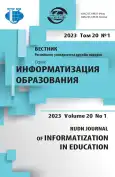Информатизация и цифровизация педагогического образования: проблемы и перспективы развития
- Авторы: Китикарь О.В.1
-
Учреждения:
- Приднестровский государственный университет имени Т.Г. Шевченко
- Выпуск: Том 20, № 1 (2023)
- Страницы: 63-77
- Раздел: ГОТОВНОСТЬ ПЕДАГОГОВ К ИНФОРМАТИЗАЦИИ
- URL: https://journal-vniispk.ru/2312-8631/article/view/321289
- DOI: https://doi.org/10.22363/2312-8631-2023-20-1-63-77
- EDN: https://elibrary.ru/CIYGCL
- ID: 321289
Цитировать
Полный текст
Аннотация
Постановка проблемы. Современное педагогическое образование призвано удовлетворять потребности государства и запросы, связанные с глобальной информационной и цифровой трансформацией общества. Это усиливает тенденции к модернизации системы подготовки педагогов на государственном, региональном, локальном и субъектном уровнях. На основании анализа понятий «цифровизация», «информатизация», «педагогическое образование», «педагогическая деятельность» определяется наполнение параметров цифровой образовательной среды в зависимости от ее функций по обеспечению качества педагогического образования. Учтены взаимосвязь и взаимозависимость компонентов цифровой образовательной среды и структурно-функциональных конструктов педагогического образования. Методология. Определение проблем и перспектив развития информатизации и цифровизации педагогического образования основано на терминологическом и содержательно-функциональном анализе понятий цифровизации и информатизации образования, цифровой образовательной среды. Проведен структурно-функциональный анализ позитивного опыта формирования информационных и цифровых образовательных сред в вузах России. Определены критерии направлений развития информатизации и цифровизации педагогического образования на всех уровнях, исходя из требований государства, отраженных в нормативных документах, запросов регионов, определенных на основе анализа стратегий их развития, модернизации структуры, содержания и требований к подготовке на институциональном уровне. Результаты. Выявлены и обоснованы теоретические аспекты сопряженности терминов информатизации и цифровизации, влияющие на модернизацию сферы подготовки педагогов. Рассмотрены проблемы системы педагогического образования, которые указывают на необходимость ее реформирования на основе интенсификации информационной и цифровой трансформации данной сферы. Заключение. Определены требования и направления модернизации педагогического образования в условиях цифровой трансформации, которые связаны с изменением подходов к подготовке педагогов, необходимостью интегративного рассмотрения функций педагогической деятельности и цифровой образовательной среды.
Об авторах
Оксана Васильевна Китикарь
Приднестровский государственный университет имени Т.Г. Шевченко
Автор, ответственный за переписку.
Email: naboka.oxana@yandex.ru
ORCID iD: 0000-0002-8502-4508
кандидат педагогических наук, доцент, заместитель декана факультета физической культуры и спорта
Приднестровская Молдавская Республика, 3300, Тирасполь, ул. 25 Октября, д. 107Список литературы
- Grinshkun VV. Quality of information resources and professional qualities of teachers. Interrelation and problems. Informatics and Education. 2013;(1):79–81. (In Russ.)
- Grinschkun V. Сloud technologies as a basis for the integration of teacher training systems for the international baccalaureate schools. RUDN Journal of Informatization in Education. 2020;17(3):210–219. https://doi.org/10.22363/2312-8631-2020-17-3-210-219
- Robert IV. Training of future teachers in the field of designing immersive educational technologies. In: Zinchenko YuP. (ed.) Pedagogical Education in Modern Russia: Strategic Guidelines for Development. Rostov-on-Don, Taganrog: Southern Federal University Press; 2020. p. 25. (In Russ.)
- Zaslavskaya OYu. Informatization of education: a new understanding of the place and role of the teacher in the educational process. Vestnik MSPU. Series: Informatics and Informatization of Education. 2007;(2):81–83. (In Russ.)
- Atanasyan SL. Formation of the information educational environment of the pedagogical university (dissertation of the Doctor of Pedagogical Sciences). Moscow; 2009. (In Russ.)
- Grinschkun V. Project-based learning approach for teaching mobile application development using visualization technology. International Journal of Emerging Technologies in Learning. 2020;15(8):130–143.
- Kondakov AM. Education and socio-economic development of Russia. Professional Education. Capital. 2010;(3):8–10. (In Russ.)
- Akarowhe K. Information communication technology (ICT) in the educational system of the third world countries as a pivotal to meet global best practice in teaching and development. American Journal of Computer Science and Information Technology. 2017;5(2):1–5. https://doi.org/10.21767/2349-3917.100010
- Vishnevskaya GV. Technological approach in the pedagogical process of the higher professional school. Proceedings of the Penza State Pedagogical University named after V.G. Belinsky. 2008;(6):235–239. (In Russ.)
- Drobysheva IV. Teaching students in the methodology of using EDCs and ICT. Informatization of Education – 2007: Materials of the International Scientific and Practical Conference, 28–31 May 2007. Kaluga; 2007. p. 134–136. (In Russ.)
- Grinschkun V. Influence of extra-learning development of electronic resources on the development of personal qualities of schoolchildren. PalArch’s Journal of Archaeology of Egypt / Egyptology. 2020;17(4):1281–1292.
- Borisenkov VP, Gukalenko OV, Rozov NKh. Reformation of pedagogical education and systems of advanced training of teachers. Vestnik Moskovskogo universiteta. Series 20: Pedagogical Education. 2016;(1):3–6. (In Russ.)
Дополнительные файлы









